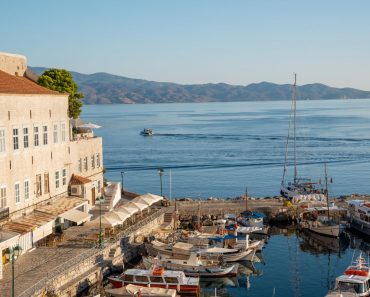Some Americans are pressing pause on their European travel plans as a burgeoning body of reports show European favorability of the United States dropping considerably in light of the ever-evolving political pandemonium in the States.
These U.S. travelers are wary of anti-American sentiment, as some surveys suggest that nearly half of European citizens have stopped seeing the U.S. as the most important ally — and as news of America detaining or deporting some Europeans has various European countries issuing travel advisories.
But is the sentiment on the ground actually what Americans are fearing from home?
According to a flash study conducted by travel marketing firm MMGY Global — amidst President Trump’s significant tariff spikes — 80% of the 1,000 U.S. adults surveyed said their travel behavior will change as a result of current economic conditions. More than half (53%) reported being worried that, as Americans, they’ll be less welcome in other countries (while others report facing financial concerns). Twenty-nine percent are opting for domestic destinations over international ones, while 22% are shortening the length of their stay.
The reality is, some Americans feel torn between wearing targets on their backs and serving as ambassadors of sorts.
What Are Americans Experiencing?
As an American living in Europe — in a tiny town in the south of Spain — I haven’t personally felt unwelcome. While I’ve traveled around the bulk of Europe over the last decade, I’m one woman in one small slice of Spain at the moment, which makes up just one corner of a fragment of the continent. I can say, however, that I am constantly being asked, “What is going on in the U.S.?” It happens whether I’m at a cafe, a co-working office, a barbecue or a bar bathroom.
Despite my pretty pleasant experience in a relatively vacant village in the agricultural countryside, however, Spain has made major headlines for the protests cropping up across more populated cities, such as Barcelona. There, thousands of water pistol-toting locals gathered to chant, “Tourists go home!” While they were not protesting American tourists in particular, the crowds that have gathered against overtourism, at large, are certainly not welcoming ones.
But even in Barcelona, a 33-year-old American human rights lawyer I spoke with, who requested anonymity, says she hasn’t seen any changes in her community since all the political pivots.
I’ve never been faced with any kind of hostility; everyone has been super-friendly to me.
“I’ve never been faced with any kind of hostility; everyone has been super-friendly to me,” she said. “So, I don’t feel scared, but I feel embarrassed. I used to have pride.”
In fact, more and more Americans are asking her how she managed to obtain her dual Austrian citizenship that has allowed her to move to Spain — and how they can do it, too.
“So many more friends want to come to Europe — whether it’s for tourism or living — because they don’t want to live in the U.S.,” she said. “I haven’t heard any negative sentiment, but maybe it’s just not coming from my circle.”
RELATED: 15 Countries That Offer Digital Nomad Visas
Of course, our circles in Spain alone can’t speak to Europe at large, either.
A 29-year-old American who works in the travel-booking sector in Athens, Greece (who also asked to remain anonymous), told me that the sentiment in both her circle of nomadic American friends and her circle of European colleagues is in stark contrast to what’s portrayed in the media.
“I definitely don’t think people shouldn’t travel to Europe,” she said, adding that “if Americans feel less welcome, it’s mostly because of the divisions between countries and politics — but, ultimately, travel is the best way to overcome these things.”
If Americans feel less welcome, it’s mostly because of the divisions between countries and politics — but, ultimately, travel is the best way to overcome these things.
She believes most destinations aren’t upset with American tourists; rather, they’re frustrated by mass tourism in general.

Credit: 2025 dimbar76/stock.adobe.com
“I think the issue is more about responsible tourism versus irresponsible tourism,” she said, advising American travelers to be courteous of cultural customs, embrace differences, support the local economy (such as by staying in local hotels over controversial short-term rentals) and decentralize tourism by visiting less-frequented areas that could use the tourism dollars.
RELATED: 5 Hidden Gems in Northern Italy
“Greece’s whole economy is tourism, to an extent, so they’re not going to be like, ‘Don’t come,’” she said. “Whether or not they like tourism, they need it.”
She acknowledges that the notion that tourism is crucial to the economy may not be the same in other European countries she has called home, such as Switzerland, where the sector doesn’t make up such a significant portion of the GDP. But while she says the Swiss may not care quite as much as the Greek if Americans were to stop visiting, she hasn’t felt unwelcome there, either.
“I wouldn’t say I feel unwelcome anywhere in Europe; I just feel very self-conscious,” she said. “It’s kind of like a little PR tour, in a way — explaining what it is to be an American outside of the news cycle.”
What’s the European Perspective?
Marta Corte-Real, a local native of Lisbon, Portugal, and a tour guide for ToursByLocals, says many of her American guests have also expressed unease about the current political climate, telling her that they feel “ashamed” and “sorry.” But she reassures them of the vital role tourism plays in the local economy.
While Portugal has recently raised tourist taxes, Corte-Real says she lets guests know how much American visitors are very much welcome there. As a Portugal summer visitor, I can attest to this.
RELATED: Are Americans Welcome in Canada?
“I even give them numbers, so they can really understand just what a large slice of our GDP comes from tourism — and how sincerely we appreciate all our overseas guests,” Corte-Real said. “Speaking of numbers, I also let them know that America is, of course, a huge country, and we’re aware here of how many millions of people did not vote for the current administration.”
Yvonne Kopmels, a ToursByLocals guide who hails from Amsterdam, says his team has also been asked about anti-American sentiment amongst the locals — but he hasn’t experienced it, either.
While Amsterdam has made its own efforts to staunch overtourism — also by raising tourist taxes, as well as by banning new B&Bs — the city seems to be more pressed about preserving the place and the quality of life for its residents than about keeping Americans out.
No one has unwelcome feelings toward U.S. visitors. We think a conversation between humans from different parts of the world is more important than ever.
“No one has unwelcome feelings toward U.S. visitors,” Kopmels said. “We think a conversation between humans from different parts of the world is more important than ever. And to travel and learn about another culture and experience it for yourself is invaluable.”
In other words: Travel is precisely what disproves the preconceived prejudices perpetuated by the negative news that’s instilling fear in Americans to travel in the first place.
Ultimately, the reality that many U.S. travelers and expats, like me, are experiencing within Europe is strikingly different from the perceived anti-American sentiment. And while others have had very valid experiences that seem unsafe or even scary, suffice it to say, there’s always more to the story than meets the eye — or your smartphone screen.
Travel is one of the best forms of education we have, and not traveling can only create a self-fulfilling prophecy: a greater divide.






